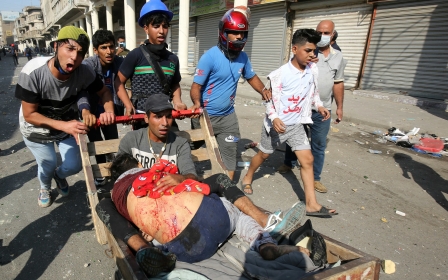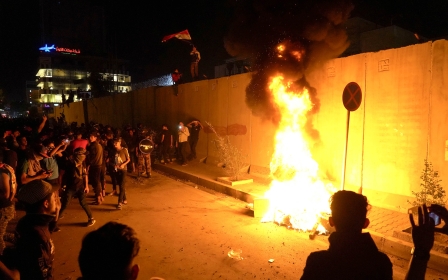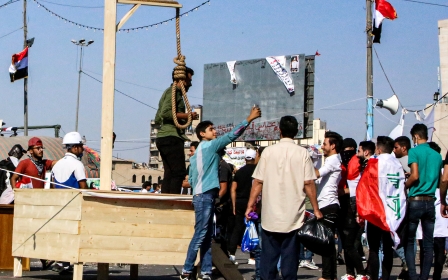'Only the flag in my hand': Riot police torch sit-in tents in Basra as protests continue

Activists in Basra have remained vigilant in the face of state repression, determined to continue protests which have spread across the country like wildfire.
Hundreds of protesters gathered on Tuesday in central Basra in front of the governorate building, attempting to push down the concrete blocks surrounding it.
Some activists had set up tents outside, staging a sit-in against the rampant corruption, unemployment and poor services afflicting the country.
In response, security forces opened fire, using live ammunition, rubber bullets and tear gas to disperse the crowds.
According to protesters at the scene, security personnel also set light to a number of the tents.
New MEE newsletter: Jerusalem Dispatch
Sign up to get the latest insights and analysis on Israel-Palestine, alongside Turkey Unpacked and other MEE newsletters
“For no reason, the riot police burned our tents and dispersed us by force using tear gas and live bullets,” said Hussam Mohammed, one of those inside the tents.
“I protest carrying only the flag in my hands, while the security forces carry all kinds of weapons to kill us."
Iraqis in Basra, like much of the rest of the country, have repeatedly called for the government to resign and for far-reaching systemic change.
Basra was the site of mass demonstrations in 2018 that were arguably the precursor of the wider protest movement in Iraq today.
Protests broke out again late last month after a pause for the religious holiday Arbaeen.
“Since 2003 (after US-invasion of Iraq), the governments did not provide us the minimum life requirements like people in rest of countries,” said Mohammed.
“We are demanding a change to the current political faces and a re-written constitution agreed by the people, the seperation of religion and politics, and the most important thing is getting rid of the Iran-backed militias, the big cancer in Iraq’s body."
Twenty-six-year old Mohammed Aqeel said: “The Basra protests will be escalated and never stop as the government did not respond to the people’s order to resign - our demand is clear, we want the government to submit its resignation, the executive and legislative’s government, both."
Aqeel added that he had lost faith in Prime Minister Adel Abdul Mahdi's reforms as he failed to address the previous reforms.
“A radical change of the system is the better solution and to calm the anger of the protests,” he added.
'Appalled'
On Tuesday, hundreds of protesters gathered near the port of Umm Qasr, south of Basra, and blocked the entrance.
Protesters seized a military tank and vandalised it, while clashes between protesters and security forces left two protesters dead and scores injured.
Further protests were expected on Wednesday in Umm Qasr, which is Iraq's only outlet to the sea and a vital lifeline for the country's economy.
Authorities have repeatedly shut down the internet, preventing protesters from posting photos and videos on social media who are documenting violations by the security services.
The Netblocks monitoring group said that Iraq remained largely offline 41 hours after the shutdown was imposed, leaving "citizens cut off from the world amid crisis".
“Appalled by continued bloodshed in Iraq,” the UN Iraq Special Representative Jeanine Hennis-Plasschaert said on Twitter after her visit to Tahrir Square, the epicentre of protests in Baghdad.
“Violence only begets violence, peaceful demonstrators must be protected. It is high time for national dialogue.”
Since the anti-government protests erupted in early October in the capital Baghdad and other Iraqi cities, more than 260 protesters have been killed and thousands were injured.
Sarkawt Shams, a member of the Future bloc in parliament, said: “I think the government has failed to take steps to build trust with people, burning tents prove that the government is on a valley and the protesters on another."
“The people who made him PM [are] mostly to blame for not providing an alternative”.
Iraqi Interior Ministry Spokesman Khalid al-Muhanna did not answer repeated requests for interview.
Middle East Eye delivers independent and unrivalled coverage and analysis of the Middle East, North Africa and beyond. To learn more about republishing this content and the associated fees, please fill out this form. More about MEE can be found here.




